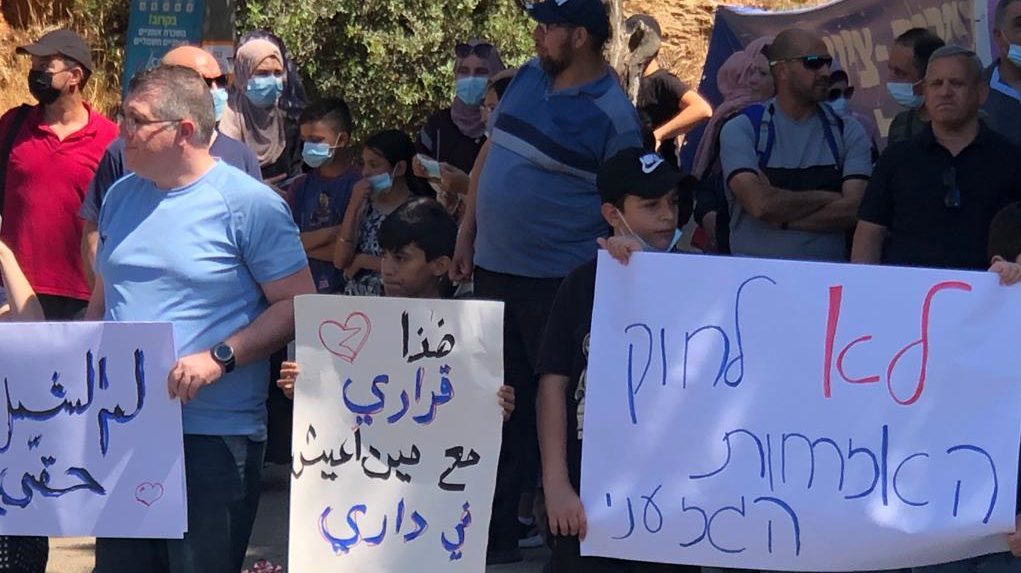Separated Palestinian Families Ready for End to Israel Citizenship Law
Up to 45,000 Arab families are affected by the law that prevents Palestinian spouses from living in Israel, but some slam this week's Knesset vote as ‘political theater’
Taiseer Khatib hopes that his family’s fortune is about to change.
For more than 15 years Khatib’s Palestinian wife, Lana, who comes from the West Bank city of Jenin, has had to regularly apply for permits enabling her to live together with her husband and their three children in the northern Israeli city of Acre.
Due to a law that was first passed in 2003, Lana Khatib has been unable to gain Israeli citizenship despite being married to an Israeli and having three children who were born inside the country.
The Citizenship and Entry into Israel Law was initially intended as a temporary measure when it first was enacted in the midst of the second intifada. It bans the automatic granting of citizenship to Palestinians who marry Israeli citizens. The law can only remain in force for one year, and must be renewed by the Knesset.
“She cannot work because it’s not allowed,” Khatib told The Media Line. “The law affects us in every sense; in the morning at 6 a.m. I have to get up and bring the children to school because Lana is [also] not allowed to drive.”
Khatib married his wife in 2005 after he met her during a visit to Jenin. After their wedding the two were forced to live separately for a few years, with Taiseer Khatib traveling between Acre and Jenin on a regular basis.

Taiseer Khatib (center) talks to reporters at a protest against the Citizenship and Entry Into Israel Law outside the Knesset on July 5, 2021. (Mossawa Center)
“Although we knew that the law is there we decided we wanted to be together and that nothing should prevent us from being together,” he recounted, adding that Lana was able to secure permits for longer stays in Acre starting in 2007.
Khatib, who once taught anthropology and sociology at the Western Galilee College in Northern Israel, is now a social and political activist who works together with a number of human rights groups.
“It’s torture,” Khatib said of the ongoing ordeal with the citizenship law. “I feel really angry that such a law can prevent families from developing in a normal way.”
This holiday season, give to:
Truth and understanding
The Media Line's intrepid correspondents are in Israel, Gaza, Lebanon, Syria and Pakistan providing first-person reporting.
They all said they cover it.
We see it.
We report with just one agenda: the truth.


Khatib joined roughly 200 people gathered outside the Knesset building in Jerusalem on Monday to pressure Israeli lawmakers to put an end to “this racist law.”
Despite being temporary, the law has continually been renewed over the years and is not applied equally to all Palestinians. For instance, the United Nations Committee on the Elimination of Discrimination against Women (CEDAW) in 2017 reported that the ban on citizenship is “absolute for inhabitants from Gaza whereas Palestinians from the West Bank can obtain limited temporary resident permits since 2005.”
Several left-wing parties and Arab lawmakers have decried the measure as being discriminatory against Israel’s Arab minority, while right-wing leaders have argued that it is necessary for Israel’s national security.
Early on Tuesday morning after an all-night debate, Knesset lawmakers failed to approve an extension of the Citizenship and Entry into Israel Law, after voting to a 59-59 tie which allows the current law to expire at midnight on Tuesday. Two lawmakers from the United Arab List-Ra’am party, a member of the government coalition, abstained, and lawmaker Amichai Chikli of Prime Minister Naftali Bennett’s Yamina party voted against the measure.
An end to the law, which expires on Tuesday, would mark a “great victory” for all the families that have been separated, Khatib said.
Nevertheless, some human rights experts believe the showdown at the Knesset is nothing more than political theater.
“It’s a political power game between the right-wing parties, [at the expense] of the families that are suffering from this policy for almost 20 years,” Jafar Farah, director of the Mossawa Center, told The Media Line.
The Mossawa Center, an NGO based in the northern Israeli port city of Haifa, has repeatedly condemned the law as a form of “racist collective punishment.”
Farah argued that Interior Minister Ayelet Shaked of the Yamina party, had fallen into former Israeli Prime Minister Binyamin Netanyahu’s hands by deciding to urgently bring the matter to a vote in the Knesset plenum.
“Shaked is not smart enough to prevent the crisis in the coalition,” he said. “This whole crisis has been designed by Netanyahu … So what if [this law] expires tomorrow? It does not mean that people will immediately get citizenship.”
Farah noted that Shaked would still retain the authority to grant or block citizenship regardless of the 2003 law. According to figures from the Interior Ministry, as of last year there were 45,000 outstanding applications for family reunification.
Although we knew that the law is there we decided we wanted to be together and that nothing should prevent us from being together
But Farah believes that these numbers are grossly inaccurate.
“There are double applications because when people are rejected by the ministry, then they apply again and again,” he explained. He said his NGO estimates that there are about 25,000 people who have applied.
Many separated families have given up on waiting for lawmakers to permit reunification, Farah said, and have already left Israel for what they hope will be greener pastures in Europe or North America.
“They should not extend this law and they should enable families to live together as humans,” he said. “They should not intervene in family life.”

